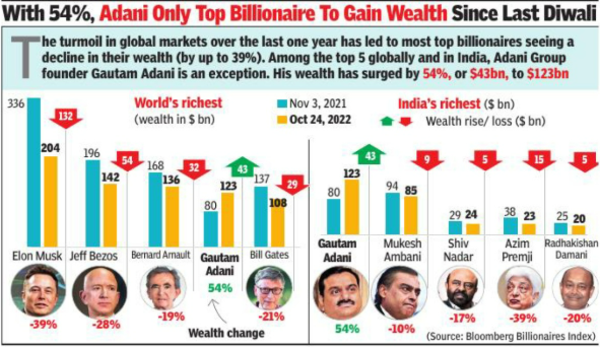The day also marked the start of ‘Vikram Samvat Year 2079’. Followed mainly by the Gujaratis who are a majority among the traders on Dalal Street, the Samvat year starts on the day of Diwali. Traditionally during the Muhurat session, individual traders and investors tend to buy stocks, even if in small quantities, and refrain from selling.
Despite a sharp selloff in Hong Kong & Chinese markets and flat trading in European bourses, the sensex started Monday’s session on astrong note and remained in a narrow range before closing 0. 9% in the green. On the NSE, the broader Nifty closed 154 points, also 0. 9%, higher at 17,731.
According to HDFC Securities MD & CEO Dhiraj Relli, the positive ending during the Muhurat session was in-line with most such sessions in the past. “Indices rose led by bank stocks, after a volatile year, aided by positive cues from European and US markets and despite the selloff in the Hong Kong and China markets. Investors hope that the positive sentiment could get carried into the new Samvat year despite some macro and global headwinds. ”
On Friday, major US indices had rallied about 2% each. That turned out to be one of the main drivers for the sensex, market players said. And earlier on Monday, markets in Tokyo and Seoul closed in the green while Shanghai and Hong Kong ended sharply lower after the close of the Party Congress in China the previousevening. Hang Seng closed 6. 4% lower — its worst single-session percentage loss in a decade, reports said.

The day’s winning session on Dalal Street added over Rs 2 lakh crore to investor’s wealth with the BSE’s market capitalisation now at more than Rs 279 lakh crore. Of the 30 sensex stocks, 28 closed with gains, BSE data showed. Among the sensex stocks, ICICI Bank, HDFC Bank and HDFC together accounted fornearly half of the index’s gains. On the other side, losses in HUL and Kotak Bank limited the sensex’s gains, according to BSE data.
On the sectoral front, BSE’s indices for capital goods, industrials, financial services, banking and telecom industries closed with gains of over 1% each, while the gauge for the FMCG industry closed in the red, becoming the only sectoral index to do so. On the day of Diwali, the BSE also began trading in electronic gold receipts (EGRs), a new product that will offer a fresh avenue for investors, jewellers and institutions to invest in the yellow metal. Since 2015, the BSE has been working collaboratively with the regulator and all market participants across India to launch various gold-based products, the exchange said in a press release.






